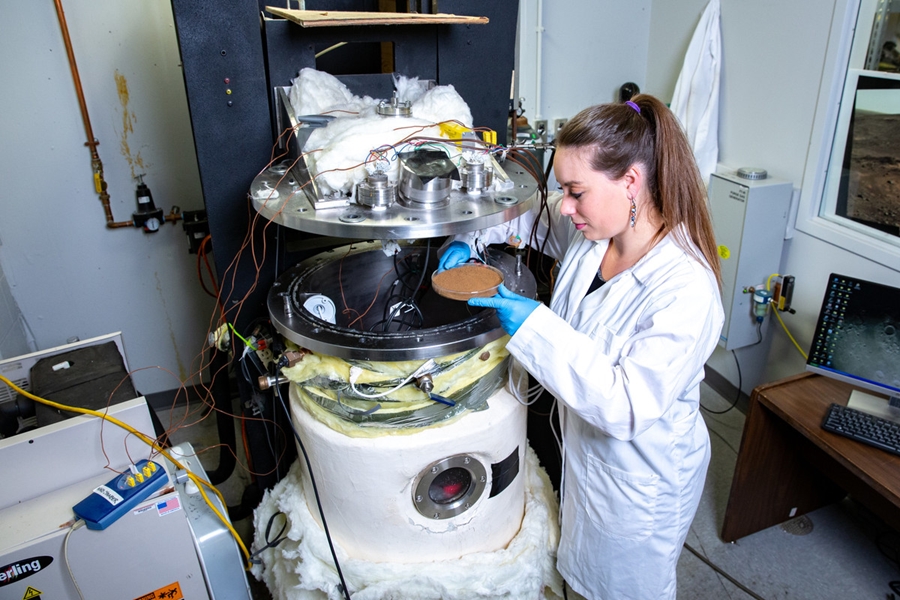Water on Mars Not as Widespread as Previously Thought, Study Finds

Researcher Rachel Slank works with the university's Mars chamber.
FAYETTEVILLE, Ark. – Water on Mars, in the form of brines, may not be as widespread as previously thought, according to a new study by researchers at the Arkansas Center for Space and Planetary Sciences.
Researchers combined data on brine evaporation rates, collected through experiments at the center’s Mars simulation chamber, with a global weather circulation model of the planet to create planetwide maps of where brines are most likely to be found.
Brines are mixtures of water and salts that are more resistant to boiling, freezing and evaporation than pure water. Finding them has implications for where scientists will look for past or present life on Mars and where humans who
eventually travel to the planet could look for water.
The scientists took all major phase changes of liquids into account -- freezing, boiling and evaporation – instead of just a single phase, as has commonly been the approach in the past, said Vincent Chevrier, associate professor and first author of a study published in The Planetary Science Journal. Former U of A doctoral students Edgard G. Rivera-Valentín and Travis S. Altheide were coauthors of the paper.
“It is looking at all the properties at the same time, instead of one at a time,” said Chevrier. “Then we build maps taking into account all those processes simultaneously.”
Doing so indicates that previous studies may have overestimated how long brines remain on the surface in the cold, thin and arid Martian atmosphere, Chevrier said. “The most important conclusion is that if you do not take all these processes together, you always overestimate the stability of brines. That is the reality of the situation.”
Favorable conditions for stable brines on the planet’s surface are most likely to be present in mid- to high-northern latitudes, and in large impact craters in the southern hemisphere, he said. In the shallow subsurface, brines might be present near the equator.
In the best-case scenario, brines could be present for up to 12 hours per day. “Nowhere is any brine stable for an entire day on Mars,” he said.
About the University of Arkansas: The University of Arkansas provides an internationally competitive education for undergraduate and graduate students in more than 200 academic programs. The university contributes new knowledge, economic development, basic and applied research, and creative activity while also providing service to academic and professional disciplines. The Carnegie Foundation classifies the University of Arkansas among fewer than 3 percent of colleges and universities in America that have the highest level of research activity. U.S. News & World Report ranks the University of Arkansas among its top American public research universities. Founded in 1871, the University of Arkansas comprises 10 colleges and schools and maintains a low student-to-faculty ratio that promotes personal attention and close mentoring.
Topics
Contacts
Vincent Chevrier, associate professor
Arkansas Center for Space and Planetary Sciences
479-575-7778,
vchevrie@uark.edu
Bob Whitby, science and research writer
University Relations
479-575-4737,
whitby@uark.edu
Headlines
Mike Dean Joins I³R as Director of Information Technology
Mike Dean, a senior director at Burlington Northern Santa Fe Logistics, has joined the U of A Institute for Integrative and Innovative Research as the director of information technology.
College of Engineering Online Advisor Receives Employee of the Quarter Award
Marjorie Pasch, site coordinator for two online master's degree programs, has been awarded the Employee of the Third Quarter for the College of Engineering.
University of Arkansas Upward Bound Students Shine at National STEM Conference
High school students Jade Turner, Tinsley Pretty, Emma Vaughan, Juan Monterrozas, Kabryn Cunningham and Adriana Maqueda in the U of A Upward Bound program attended a national conference in STEM.
College of Education and Health Professions Presents Inaugural Service to Arkansas Award
Deniece Honeycutt, Jenny Dura, Savanna Gragg and Annie Zay — members of the Early Care and Education Projects team — were honored for professional development work with Arkansas early educators.
Workday Wednesday Webinar: Change Job Types & Requesting Changes
Discover the power of seamless job transitions and streamlined job data changes in the upcoming Workday Wednesday Webinar: "Change Job Types & Requesting Changes" at 2 p.m. Wednesday.




